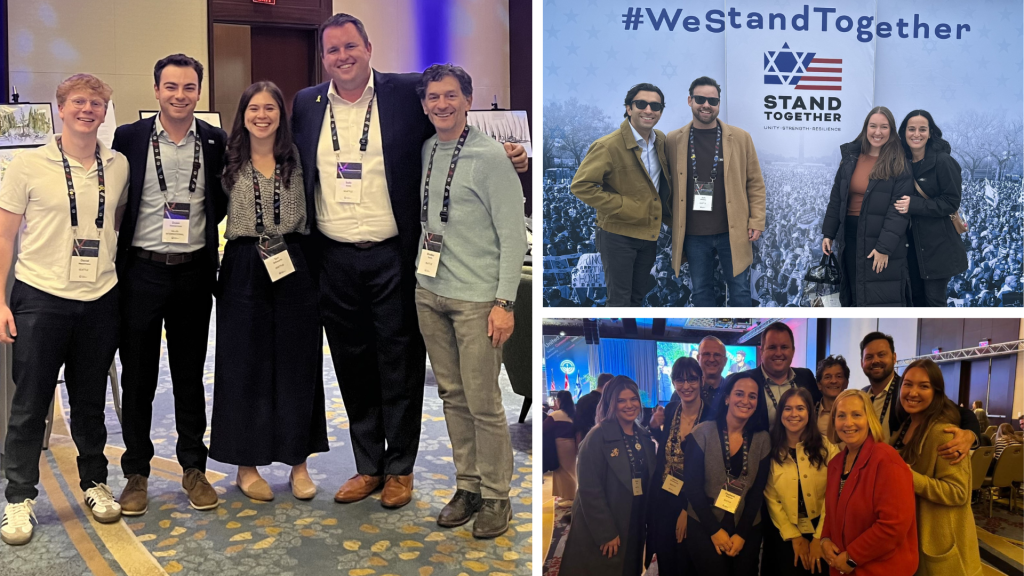
November 15, 2024
Dear Friends,
In the opening chapter of this week’s Torah portion, Vayera, we see Abraham welcoming three strangers, Sarah’s disbelief about bearing a child, and the beginning of the story of Sodom and Gomorrah. The story of Sodom and Gomorrah struck me this week. God tells Abraham that the sin of the people there is so grave that if confirmed, the cities will be destroyed. Abraham negotiates, asking if even 50 righteous people could save the cities, then 45, 40, down to 10 righteous people.
Ultimately, the cities are destroyed, yet Abraham’s act of bargaining with God speaks to his desire to see the good amidst the evil. When God looked at Sodom, He saw evil. But Abraham held onto hope that there was something worth saving. It’s easy to be hopeful when things are good; holding onto hope in darkness is harder.
I just returned from the Jewish Federations of North America (JFNA) General Assembly (GA) conference which brought together nearly 3,000 leaders from Jewish communities around the world. While it was powerful to be together, there were reminders throughout the conference that it remains an immensely difficult time. We all saw just a week ago a modern day pogrom as Jews were hunted on the streets of Amsterdam. We have passed the 400 day mark since Hamas attacked Israel and the subsequent war which has now expanded to be fought with Lebanon and other Iranian proxies. That, of course, means we have also passed the 400 day mark in captivity for the 101 hostages still in Gaza. At the GA we heard from multiple hostage family members and former hostages—they urged us to do anything we can to call on our elected leaders to continue to work toward a resolution that brings them home.

We continue to see deeply concerning events here locally as well. You likely read that yesterday University of Washington President Ana Mari Cauce woke up to her personal home and car vandalized with anti-Israel, pro-Palestinian graffiti, and symbols associated with Hamas. The perpetrators proudly posted videos of themselves committing these crimes on social media. I was in touch with President Cauce yesterday to offer our condemnation of such vandalism and was quoted in the Seattle Times this morning. We cannot stand for graffiti on our synagogues nor can we stand for graffiti targeting other public officials—it only serves to further erode civil society.
I was particularly struck by the words of the journalist Bari Weiss who spoke at the GA closing plenary. Bari commented that since the Holocaust, we, the Jewish people, have been living in a sort of “vacation from history” as it felt like the challenges of hostility and hatred we faced for centuries were things of the past. However, that vacation has come to an end. The challenges our people have faced throughout history are back and we must face them head on to ensure our future.
And, at the same time, it is not all darkness that we face. One of the other things discussed throughout the GA was the surge of interest taken in Jewish life. From rising participation at JCCs, to increasing enrollment at summer camps, to shuls that are more filled on Shabbat, every segment of Jewish life is seeing elevated interest and engagement. Our job must be to both meet the moment in combating antisemitism, but also to meet the moment in fostering a thriving community for today and tomorrow.
Our work at the Federation is exactly that: to address today’s urgent needs while also carrying forward the hope and promise of a bright Jewish future. In the face of innumerable challenges, may we be like Abraham, searching for good, and holding onto hope even when it feels difficult to see.
Shabbat shalom,

Solly Kane, President & CEO
Jewish Federation of Greater Seattle

The Jewish Federation of Greater Seattle is a 501(c)(3) non-profit organization.
Copyright © 2024 Jewish Federation of Greater Seattle. All rights reserved.